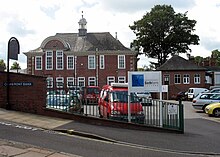
A sixth form college (pre-university college in Malaysia) is an educational institution, where students aged 16 to 19 study typically for advanced post-school level qualifications such as A Levels, Business and Technology Education Council level 3 (BTEC), and the International Baccalaureate Diploma, or school-level qualifications such as General Certificate of Secondary Education (GCSE) examinations and BTEC level 2 qualifications. In many countries this type of educational institute is known as a junior college. The municipal government of the city of Paris uses the phrase 'sixth form college' as the English name for a lycée (high school).[1]
In England and the Caribbean, education is currently compulsory until the end of Year 13, the school year in which the pupil turns 18.[note 1][2] In the English state educational system, pupils may either stay at a secondary school with an attached sixth form, transfer to a local sixth form college, or go to a more vocational further education college, although in some places not all these options are available. Some places only provide tertiary colleges, a "combination" between sixth form and further education colleges.[3] In the independent sector including public schools, sixth forms are an integral part of secondary schools, and there are also a number of smaller-scale independent sixth form colleges. In Scotland and Wales, education is only compulsory until the end of Year 11.
Students at sixth form college typically study for two years (known as Years 1 and 2 – Years 13 and 14 in Northern Ireland – or lower sixth and upper sixth). Some students sit AS examinations at the end of the first year, and A-level examinations at the end of the second. These exams are called C.A.P.E. (Caribbean Advanced Proficiency Examination) in the Caribbean. A variety of vocational courses have also been added to the curriculum.
There are currently over 90 sixth form colleges in England and Wales. Most of these perform extremely well in national examination league tables. In addition, they offer a broader range of courses at a lower cost per student than most school sixth forms. In a few areas, authorities run sixth-form schools which function like sixth-form colleges but are completely under the control of the local education authorities. Unlike further education colleges, sixth-form colleges rarely accept part-time students or run evening classes,[citation needed] although there is one boarding sixth-form college, Peter Symonds College, which takes Falkland Islands students for sixth form.[4]
- ^ "Children & families Archived 9 October 2010 at the Wayback Machine." (Archive) City of Paris. Retrieved 20 July 2010.
- ^ Education and Skills Act 2008, Office of Public Sector Information.
- ^ Watson, Judith; Church, Andrew (2009). "The Social Effects of Travel to Learn Patterns - A Case Study of 16-19 Year Olds in London". Local Economy: The Journal of the Local Economy Policy Unit. 24 (5): 389–414. doi:10.1080/02690940903166971. S2CID 145187656.
- ^ Kingston, Peter (21 November 2005). "'It feels like being punished'". The Guardian. Retrieved 18 January 2020.
Cite error: There are <ref group=note> tags on this page, but the references will not show without a {{reflist|group=note}} template (see the help page).